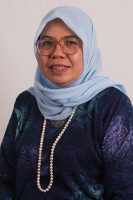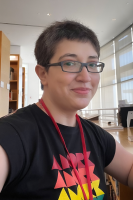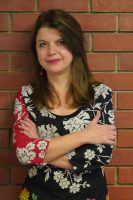CAA News Today
CAA113 CAA-Getty International Program Participants Announced!
posted Dec 11, 2024
The CAA-Getty International Program will welcome eight new scholars and four program alumni to the CAA 113th Annual Conference!
Now in its thirteenth year, this program brings a cohort of art historians, museum curators, and other visual arts professionals from around the globe to the CAA Annual Conference to connect with a selection of former participants at a preconference colloquium and alumni session, which examine topics such as historiographies, interdisciplinary and transnational methodologies, decolonizing museums, and other pressing issues in the field.
The 2025 preconference colloquium will be led by special guest Clement Akpang.
Read more about the 2025 program participants below, visit our website to learn more about the first ten years of the CAA-Getty International Program, and register for CAA113!
2025 PARTICIPANTS
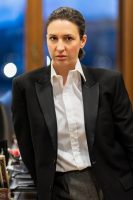 |
Aida Bičakčić obtained her degree in art history from the Faculty of Philosophy at the University of Sarajevo in 2008. From 2009 to 2023 she has held the positions of advisor for movable heritage, and later advisor for art history at the Commission to Preserve National Monuments of Bosnia and Herzegovina, for which she was involved in numerous research projects that resulted in designating cultural assets as National Monuments of Bosnia and Herzegovina. Starting in April 2023 she continued her career as the head of the collection at Ars Aevi, Sarajevo, curating a traveling exhibition of the collection, Sol LeWitt at KRAK Center for Contemporary Culture, and the Ars Aevi Video Art project, while also acting as jury member for a competition for young artists. In 2022, she began her PhD at Faculty of Humanities, Zagreb University, with a focus on history of conservation with the thesis “Protection of Architectural Heritage in the People’s Republic of Bosnia and Herzegovina between 1945 and 1960.” |
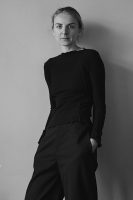 |
Inesa Brašiškė is a Vilnius-based art historian and curator. She holds an MA from the Modern and Contemporary Art: Critical and Curatorial Studies program (MODA) at Columbia University. Her curatorial practice spans multiple institutions including the National Gallery of Art (Vilnius), Contemporary Art Centre (CAC, Vilnius), e-flux screening room, and Art in General. Following a decade of independent curatorial work, she now serves as head of research at the Sapieha Palace, a CAC branch, where she curates contemporary art exhibitions, directs a monthly artists’ film program, and organizes an annual symposium. Brašiškė’s academic research focuses on conceptual art and displacement, artistic labor, feminist art history writing in Eastern Europe, and avant-garde cinema and feminist screen cultures since the 1960s. Brašiškė’s recent scholarship reconsiders abstract painting through feminist histories of making, examines the critical potential of blurring, and explores artistic and curatorial engagements with archives in the Baltics.Her writing has appeared in MoMA’s C-MAP and Mousse as well as in numerous exhibition catalogs and books. Brašiškė was nominated for the ICI Curatorial Award in 2014. Her research has been supported by the Getty Library Research Grant, the Paul Mellon Centre Grant, and the AWARE Research Residency. |
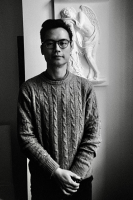 |
Conan Cheong is a PhD candidate in art history and archaeology at SOAS University of London, holding an MA from the same department. His doctoral research, centering on the personal collections of Buddhist monks in Laos of historical photographs and objects. investigates how Buddhist communities conceptualize the self through material practices of memory, memorialization, and representation. He is curatorial advisor for the Museum of Buddhist Art in Vat Saen Sukharam, Luang Prabang (opening in 2026). As curator at the Asian Civilizations Museum, Singapore, from 2016–23, he worked to develop collaborative relationships with source and use communities, and in the exhibition Body and Spirit: The Human Body in Thought and Practice (2022–23). He is a member of Circumambulating Objects: On Paradigms of Restitution of Southeast Asian Art (CO-OP). |
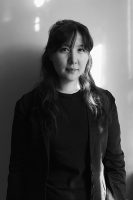 |
Goomaral Dalkh-Ochir is an art historian at the Fine Arts Zanabazar Museum in Ulan Bator, where her research focuses on the history of Mongolian fine art and the study of Mongolian Buddhist art. She completed her bachelor’s and master’s programs in art studies at the National University of Mongolia, focusing on the topic of Zanabazar art, and she is currently pursuing a doctoral program. From 2014–16, she served as a lecturer in medieval art history at the Mongolian National University of Arts and Culture. Since 2014, she has compiled five catalogs that explore the history of Mongolian Buddhist art. She was a coauthor of the book Unique Masterpieces (2018). Since 2017, she has been a member of the Museum and Collection of fine Arts Committee of the International Council of Museums. |
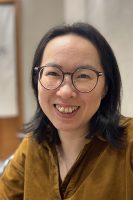 |
Jing Liu is an assistant professor at the Sichuan Fine Arts Institute, China. She received her PhD in art history from Peking University with a dissertation on religious art in southwest China from the tenth to thirteenth centuries. Building on this work, she published The Transformation and Creation of Images: A Study of Guardian Deities of the Song Dynasty in Dazu and Anyue, Sichuan (2024). She is currently working on a new book about natural aesthetics in Chinese landscape painting. Recently, her academic focus has expanded to explore the relationship between cultural heritage and community, including a project examining how patrons, tourists, and pilgrims have interacted with Buddhist carvings over time. As a curator at the Ptolemy Museum in Hong Kong, she is also interested in the spread of Western astronomical imagery in modern China, drawing insights from the museum’s collections. |
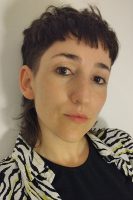 |
Nadia Martin is an assistant researcher at the National Scientific and Technical Research Council of Argentina (CONICET), currently on a postdoctoral fellowship granted by the same institution until her appointment is formalized. She holds a PhD in comparative theory of the arts (CONICET-UNTREF), a master’s degree in visual arts curating (UNTREF), and a bachelor’s degree in communication sciences (UBA). Her research focuses on body, territorial, and techno-scientific imaginaries in contemporary artistic practices, with an emphasis on Latin America. It is framed by perspectives at the intersections of feminisms, new materialisms, and critical posthumanisms. She is involved in the PIP-CONICET and PICT-AGENCIA research projects. Among other distinctions, she is the recipient of the Goethe-Fellowshipat documenta Archiv, the ZUKOnnect Fellowship, and support from the Casa de Velázquez (Madrid). She teaches undergraduate and graduate courses at UNTREF and undergraduate courses at UBA. She is founder and manager of the ENROQUE art-in-territory project. |
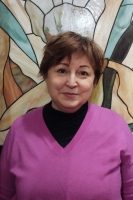 |
Oksana Remeniaka is a chief of department of sociocultural art studies at the Modern Art Research Institute of the National Academy of Arts of Ukraine (Kyiv). She is the author of books and numerous articles on art history and culture. Dr. Remeniaka was a Fulbright Research Scholar, conducting research at Columbia University’s Harriman Institute with the project (2019–20). Dr. Remeniaka is an expert in cultural processes of Polish-Ukrainian borderland, Ukrainian culture at the turn of the nineteenth century, diaspora visual arts of the interwar and postwar periods, and wartime Ukrainian modern art. She is the author of of numerous texts for modern art exhibits and projects in various Ukrainian museums and galleries, including A Chronicle of Inspiration in a Fierce Time (2023), Art in Times of Plague with a virtual catalog of artists’ works from Ukraine, Poland, the United States, Italy, and Georgia (2020). |
 |
Lucía Stubrin holds a PhD in history and theory of the arts from the Universidad de Buenos Aires and is a research professor at the Universidad Nacional de Entre Ríos (Argentina). She directs research projects within the framework of the Grupo de Estudio Biosemiótica, Arte y Técnica (GEBAT), and is an independent curator specialized in technopoetics. She is the author ofBioarte. Poéticas de lo viviente (2020, Eudeba/Ediciones UNL). Since 2010, she has received national (CONICET) and international (Getty Foundation, European Commission Erasmus Mundus, Fundación Carolina, AUGM) doctoral and postdoctoral grants for her research in the field of art-science-technology with emphasis on life sciences and bioart. Since 2023 she has been a research fellow at the Universidad de Barcelona. |
ALUMNI PARTICIPANTS
This program is made possible with support from Getty through its Connecting Art Histories initiative.




